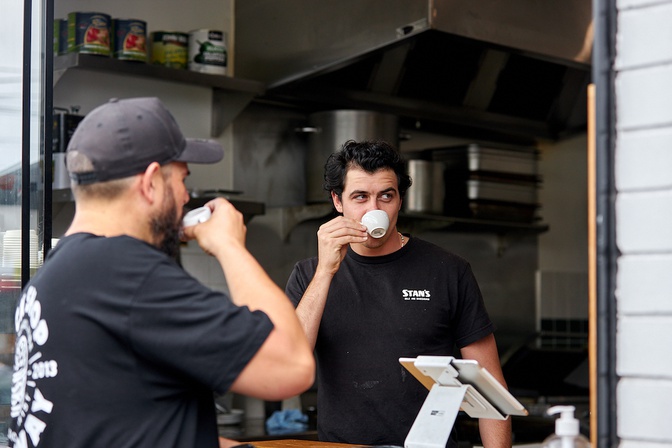The thought of striking out on your own is satisfying, but being the boss can be a bit of a learning curve. In partnership with Buddy Capital, we speak with two experienced cafe owners about their “unsexy” but practical tips for getting your first business off the ground.

Dan Dick, owner of Camberwell’s Nigel, and Stan’s Deli owner Alex Gavioli both know what it’s like to start fresh. The duo represents a new wave of east-side spaces with a coffee focus (Stan’s is pulling double duty as a sandwich deli) that have opened over the last few years. Having succeeded through some tough times for the hospitality industry, Dick and Gavioli share their secrets for opening a new business.
“I think the biggest thing when starting a business is you’ve got to know what story you want to tell,” says Gavioli. “There’s a lot of people that come up to me with an idea and I sit down with them for five minutes and flesh out the idea and they actually realise they don’t know what they want to sell or what story they want to tell.”
Consider things like your point of difference and strengths. What makes your cafe identifiable? How do you want people to perceive your business? Having a clear picture of what you do and how you operate is more than an abstract branding exercise, it’s the best way to stay on track – even when times get tough. “Know what you want to do and really stick with that. There’s a lot of people that come into your world, especially in business, that try to tell you otherwise. You need to stick true to that story ... You have really good weeks, you have really bad weeks. It’s a rollercoaster.”
You don’t have to come into a new business with a head full of life lessons. Particularly if it’s your first time going it alone, leaning on the experience of others can be vital. “Don’t be coy about your desire to get into business,” says Dick. “Go and speak to owners and operators and people who work in business. Everyone borrows concepts from one another, so once you’ve got an understanding of what you’re trying to achieve with your own business, try and leverage the knowledge of other people.”
For Dick – an old hand in the coffee game – that network was already well established, but it’s okay to simply reach out to new connections. Even family and friends can be a gateway, so don’t be shy about reaching out.
“A lot of people get into this industry with this idea that they’re either a great chef or an amazing barista or great front of house person, and they think that’s going to be the thing that drives their success,” says Dick. The real driver of success, though, is what happens behind the scenes. “If you get excited about the back end of your business, you start to put in place systems and structures that allow you to turn a concept into a business.”
Dick’s been in the industry long enough to know that most cafe owners aren’t business school grads. Dick uses accounting software and leans on the expertise of others to round things out. “Find accountants that you know and trust and you can forge a relationship with – it’s not the sexiest piece of advice.”
Getting a business off the ground financially can be the hardest part. When it comes to effectively spending your money, Dick says most businesses are unwilling to commit. “I think a mistake that a lot of new businesses make is that they’re really scared to spend their money on their business to begin with,” says Dick. “What I’ve realised the last couple of years is it’s really important to continue to spend money and that’s not always easy within your cash flow model.”
Both Dick and Gavioli opted to work with Buddy Capital to gain funds to access the use of coffee machines without having to commit to purchasing them outright. “If you’re a small business and you’re low on the funds, it’s such a good way to start,” says Gavioli. It’s allowed both businesses to preserve capital when needed and spend their money elsewhere.
Regardless of how you structure your business’s finances, it’s worth doing what you can to invest in your own future. “Set yourself a budget – a budget for growth,” says Dick. “Be comfortable with the idea that you can spend more money.”
Photography: Jessie Evans
This article is produced by Broadsheet in partnership with Buddy Capital.



